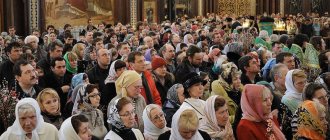Women only button
We, Christians, striving in our hearts for God, perform this ritual every day, sometimes without even thinking about its meaning and correctness of execution. When visiting a temple or at home, Orthodox Christians are baptized many times a day. At the same time, oddly enough, not all of us know how to perform this ritual properly.
Before we talk about how an Orthodox Christian should be baptized, let’s take a short excursion into history and see how the method of baptism originated and changed and what its significance is .
How to be baptized correctly, a little about the history of the ritual
The modern method of Orthodox baptism developed over a long period. At first, our ancestors, when crossing themselves, used only one finger, which symbolized monotheism, touching the forehead, chest and lips. After a certain time, the cross was applied with several fingers or the entire palm.
When Christianity divided into several movements, the Orthodox Christians baptized the forehead, shoulders (from left to right) and stomach. From the mid-16th century, people began to touch the solar plexus instead of the stomach, this was explained by the fact that the heart was located nearby.
In the middle of the 17th century, in the religious work “The Tablet” , new canons of correct baptism for Orthodox Christians were established - now our ancestors, as now, began to use three fingers, overshadowing the forehead, stomach, and shoulders. Those who baptized themselves in the old way - using two fingers - were declared heretics and punished. Quite a few bloody years passed before the differences were overcome - both methods of baptism became legal.
Church wedding in Russia
Is it possible for lefties?
And if a believer is left-handed and it is inconvenient for him to baptize with the other hand, would this be a valid reason for not using the right one? On the Christian website “Find out. pro”, an unknown author claims that for religious rituals a parishioner should use exclusively his right hand, regardless of whether he is right-handed or left-handed.
At the same time, on the pages of the publication “Moskovsky Komsomolets” (Vladimir) there is a completely different answer, which was given to the reader by priest Arkady Makovetsky. Father, on the contrary, allowed a left-handed woman to cross herself with her leading hand and added: “The main thing is not with which hand we cross ourselves, but that this sign of the cross is applied with due reverence.” Thus, left-handers can choose and accept any of the proposed answers. It is only necessary to note that you should not overshadow yourself with a mirror sign, but do everything with your left hand in exactly the same way as with your right.
How to baptize an Orthodox Christian correctly from right to left or left to right
From time to time, Orthodox Christians disagree about the correct method of baptism—starting on the right side and moving to the left, or vice versa. The method of baptizing oneself by combining 3 fingers, touching the forehead, belly, and shoulders in turn from the right side to the left was transferred to us from Byzantium. Using 3 fingers, an Orthodox Christian turns to the Trinity of the Divine Nature. And 3 fingers, located together at an equal level, symbolize the balance of the three principles. By doing this, we Christians strive to get closer to God’s Joy.
All stages of baptism have a deep sacred meaning:
- By touching the forehead, the Orthodox sanctifies the mind
- touching the stomach, sanctifies the internal organs
- shoulders symbolize the whole body
In Orthodoxy, it is customary to perform baptism with the right hand . In case of illness or some other reason that prevents you from using your right hand, it will not be a sin to cross yourself with your left.
We Orthodox Christians always make the sign of the cross, starting from the right side to the left . We give preference to the right side - after all, it is behind the right shoulder that our guardian angel is located and on the right side of the believer is the entrance to Paradise. On the contrary, the left side means hell, the refuge of unfortunate sinners. When crossing himself from the right shoulder to the left, an Orthodox Christian each time asks the Lord to protect him from sin, hoping for his mercy and support, with his thoughts directed to Paradise.
In Catholic Christianity, on the contrary, it is customary to place a cross from the left shoulder to the right. This means the movement of the soul from hell to heaven, the transformation of the material nature of people and its rise to a higher level of development.
How to prepare for Unction in church during Lent
In a different interpretation
- forehead symbolizes the sky
- belly - earth
- shoulders – the Holy Spirit, uniting all things.
After repeating the sign of the cross three times, the Orthodox worshiper bows low, thanking God for his endless love for us.
When it is necessary to baptize another, we baptize him in the same way as if he were doing it himself. For example, when a person’s back is to you, we cross from right to left, when facing – from the left shoulder to the right.
What is the difference between the signs of the cross?
It is generally accepted that those who cross themselves from left to right symbolically turn to the Lord. This means that this order of movement when performing a sign expresses the aspirations coming from man to God. In other words, such an action comes from a person.
A sign performed differently, that is, from right to left, has a different meaning. It is believed that this order is a blessing coming from the Lord to man.
Interestingly enough, priests of all Christian denominations baptize believers only from left to right. This is not accidental and has absolutely nothing to do with the type of confession. Those who cross themselves from left to right symbolically turn to God themselves. The reverse order expresses blessing. But the clergyman does not overshadow himself with a sign, but the person standing opposite him. Accordingly, for a believer the direction becomes from right to left. That is, clergy of all denominations bless parishioners in this way.
How Orthodox Christians are baptized in church and at home
Let's remember the main rules of Orthodox baptism:
- We close 3 fingers (thumb, index and middle), the remaining fingers are bent. Three fingers means the trinity of the Lord.
- we raise our hand to our forehead with the words: “In the name of the Father”
- touching his stomach: “And the Son”
- touching the right, then the left shoulder: “And the Holy Spirit”
- we bow, saying: “Amen”
Visiting God's House
- An Orthodox Christian crosses himself 3 times, bowing low before the entrance after each baptism. By doing this, a Christian affirms his love for God.
- leaving the church, repeats the ritual.
- When you are in God's house, you must kiss the temple icon. To do this correctly, we bow twice, crossing ourselves, kiss the Image, bow again, crossing ourselves
- We make the sign of the cross during the service and when approaching each of the shrines
How to properly baptize an Orthodox Christian in front of icons:
- approaching the Shrine, we cross ourselves three times with a low bow
- light a candle
- we read a prayer, thanking the Saint for his help and turning to him with a request
- As we depart, we cross ourselves three times again
It should be understood that both prayer and the sign of the cross must come from the depths of the soul with sincere faith in the acquisition of grace.
Confession: how to properly confess before communion
Orthodox Christians also baptize themselves while at home:
- in front of the Images of Saints
- before the Holy Scriptures, saying prayers
- going to bed and waking up again
- before and after meals
- starting a new business and finishing it
- leaving the house, we baptize ourselves and our home
- When you see church, it is also important to cross yourself.
When baptizing yourself, you should always remember the meaning of the sign of the cross. It is important that you need to bow after completing the baptism completely and lowering your hand . This is necessary so as not to disturb the cross pattern.
Baptism is a very important procedure for every Orthodox Christian and has a deep meaning. This must always be done calmly, without being distracted by anything, turning your thoughts to God.
Important to remember
However, at present there are no clearly established canons on how to be baptized correctly. There are only certain customs, the violation of which will not essentially lead the believer to any sin.
However, if a believer signs himself with the sign of the cross surrounded by his fellow believers, it is better not to go against the traditions that have developed among them in order to avoid disagreements. Of course, unless lengthy debates and discussions are the reader's goal.
And yet, no matter how different these and other rules are in different directions of Christianity, the believing reader should remember, first of all, that God looks at the heart and deeds of a person, and not at the accuracy with which a person observes certain rituals.
Download Orthodox calendar
Download the Orthodox calendar for free to keep abreast of all significant dates and events of the Christian world.
Share with your neighbor
Similar articles:
- Who is a cleric in Orthodoxy?
- What does the feast of the Presentation of the Lord mean in Orthodoxy?
- Is it possible to eat seafood during Lent?
- Confession: how to properly confess before communion
- What is the difference between Orthodoxy and Christianity?
- How to correctly place candles in church sequence
- Mother's prayer for children is strong
- Is it possible to eat chocolate during Lent?
- Matrona of Moscow how to get to the relics and visiting hours
- How to prepare for Unction in church during Lent
The cross as a symbol of faith
The pectoral cross is a symbol of a Christian. Everyone who has undergone the sacrament of baptism is required to wear it constantly. Here the words of the apostle “I have been crucified with Christ” come to mind. Everyone who wears crosses believes that it serves as a talisman - it helps protect against evil, lead a godly life and do good deeds. You can often hear that crosses made of expensive precious metals are not used during the sacrament. But clergy refute this erroneous opinion
It doesn't matter what the symbol of religion is. The main thing is why he was dressed as a man
The material from which the cross is made can be any. It is preferable to buy gold, silver or wooden attributes. It is believed that the baptismal cross has power, so it is advisable to wear it throughout your life. Gold products are durable and less susceptible to external influences; they last longer than other materials.
The main requirement for the cross is its consecration. This can be done in advance or at the sacrament itself.
Orthodoxy in Armenia
According to legend, the appearance of Christianity in Armenia dates back to the 1st century AD. e. They say that at that moment the apostles of Jesus Bartholomew and Thaddeus were preaching on the territory of the state. They are considered to be the founders of the Armenian Apostolic Church. The documents contain the date 301, when King Trdat III, by his decree, proclaimed Christianity as the state religion. It was then that Armenia became the first Christian country in the world.
Why are Armenians Orthodox? According to the latest censuses, it is noted that:
- 92.6% of the population belongs to the Armenian Apostolic Church,
- Armenian Evangelical Church – 1%,
- Armenian Catholic Church – 0.5%,
- Jehovah's Witnesses – 0.3%,
- Orthodox – 0.25%,
- Molokans – 0.1%,
- Other beliefs – 0.26%.
The best article for you, go to: How to get to Father Blasius at the Pafnutiev-Borovsky Monastery
Many clergy note that for a long time there has been no common church understanding between our churches, but this does not interfere with good neighborly relations.
We answer letters from readers
Is it possible for left-handed people to go to church and help the priest? Is it possible to cross yourself with your left hand?
Lyudmila
The cleric of the martyr church answers. St. George the Victorious in the city of Vidnoye priest Andrey Shein : Dear Lyudmila, everyone can go to church! And left-handed, and right-handed, and completely armless. Helping the priest and your parish is not only possible, but also necessary. Is it possible to be baptized, that is, to apply the sign of the cross to yourself with your left hand? There are two points here that can help us understand this issue. On the one hand, how would a person who does not have a right hand at all or who has injured it be baptized? Obviously the left one. On the other hand, you must decide how “unusual” is identical to “impossible” for you. This is the only aspect of church life where this question will have to be raised and answered with Christian simplicity. To answer all other questions, such as: “Which hand should I light the candle with?” - there is only one answer: with any hand.
I am 40 years old, I am disabled, I live alone. Several years ago, one of my relatives offended me very much, but after a while I realized that I need to forgive people and now I don’t hold a grudge against her. And recently she was diagnosed with cancer: surgery, difficult treatment, and her neighbors don’t really care about her. And now one mutual friend says that it was the Lord who punished her because she then offended me, a disabled person. But I didn’t wish her anything bad, I love her and forgave her a long time ago! And I still have some feeling of guilt. Is that friend right? Help me to understand.
The rector of the Church of the Great Martyr answers. Panteleimon of the city of Dubna, Archpriest Alexander Lyubimov : When something difficult happens to a person, we, indeed, often have a feeling of guilt in front of him. It stems from the realization that we didn't really love him enough, didn't help him as much as we should, or even gloated about his problems. A sincere person can see all this in his conscience. However, if he stops listening to his conscience and begins to talk about the sins of other people, all his reasoning loses all meaning. Likewise, your friend’s statement that your relative is suffering precisely because of you speaks only of her own sin. There is no truth in judging a sick friend instead of feeling sorry for her. This sin - condemnation - makes a person as if blind and closes the path of faith before him. Only God can judge man, and His judgments are not human judgments.
A person can understand these judgments only in relation to himself. If he sincerely turns to repentance, then sometimes, indeed, he can see the reasons for his sorrows, for we always suffer because of our sins. So, if a sick woman herself turns to repentance, she will definitely see the righteous judgments of God in her suffering. However, your friend, who says that God punished her, is only expressing her emotions, which have nothing to do with God’s righteous judgments. If the Lord allows her to see her own sins, then she herself will be ashamed of such thoughts, for there is nothing behind them except condemnation and anger. Only the sick woman herself, if she turns to repentance, can see the righteous judgments of God in her illness. If, instead of repentance, she also only wonders about who the Lord is punishing and for what, then she will find nothing but despair and anger.
It must be said that such discussions about the judgments of God do not bring any benefit to you either. They only lead to worries about imaginary problems. A person grabs onto them, as a rule, because he is afraid to see his real problems. However, you need to solve your real problems. For it is very important for a person to understand what prevents him from finding inner peace, finding consolation in sorrows, and God’s blessing over his life. It would be a great mistake to confuse your soul with false worries, instead of taking care of your heart and your real problems.
Sin towards your sick relative was undoubtedly in your heart, for you write that at first you were offended by her. If you have repented of it and do not wish anything bad for your relative, then what is stopping you from calming down and finding peace again? Perhaps you are missing the Sacrament of Confession and the sacrament of the Holy Mysteries, which truly heal and calm the soul. But, be that as it may, you cannot blame yourself for the fact that it was because of you that trouble happened to her. Perhaps a person who really lives a spiritual life, in your place, could feel guilty that with his foolishness and sins he tempts his neighbors and is some reason for their sorrows. But this guilt in this case would be a real conviction of his conscience, and he would not wonder abstractly about the judgments of God - who the Lord punished for what. Therefore, it is better for us to repent in the simplicity of our hearts of those sins that we see behind us, and trust in the mercy of the Lord, without confusing our hearts with false thoughts about the judgments of God that are incomprehensible to us.
If all three of you—you yourself, your sick relative, and the friend who condemns her—guess about who God punished for what, you will only find confusion in your soul and will not receive any help, not from each other. , not from the Lord. Therefore, I advise you not to torment yourself needlessly with these thoughts, but simply repent of your sins, which are always present in relationships between people, and try to bear your cross without losing love for your neighbors and hope for God’s mercy.
I became a church member many years ago and hoped that sooner or later my relatives would also come to faith. But that did not happen. My family doesn’t even want to hear about the Church. We live under the same roof, we have excellent relationships, but everyone remains committed to their own beliefs. Why is this happening?
Valentina
Archpriest Konstantin Ostrovsky, dean of the Krasnogorsk church district, answers : Did you hope that your relatives would sooner or later come to faith? They hoped correctly! And don’t give up hope, pray for them. While people are alive, they can still believe, they can repent and unite with Christ.
Every person, as the image of God, has the gift of freedom: he can believe in God or remain in the emptiness of atheism, he can be in the Church (that is, in unity with the Sun of Truth - Christ) or remain in the darkness of different religions, heresies and sects.
This freedom is given to every person and is not taken away from him until the last minute of his life. Therefore, one should not despair regarding relatives, and one should not delude oneself regarding oneself. Everything is changeable. As the Apostle Paul says: Let him who thinks he stands take heed lest he fall (1 Cor. 10:12).
And we are embarrassed and even fall into despair regarding our unbelieving loved ones because we have little faith in God. In fact, only He can call a person, and only a person himself can respond to God's call. Only God Himself leads man along the saving path, and man himself must humble himself, trust God and allow himself to be brought to the Kingdom of Heaven.
We can wish our neighbors salvation, pray for them, and we can be living and grateful instruments of salvation in the hands of God. But the times and timing of their conversion to Christ are unknown to us.
I developed the habit of making promises to the Lord, setting deadlines for fulfillment, and it happened that I did not always fulfill them. He repented and again did not fulfill it.
I think the demon gave me such a struggle with sin, knowing that there would be much more failures, and knowing that I am weak, which I myself know. But how else? So at least some brakes. Of course, ideally, you need to stop sinning completely, and it will all fall away on its own, but I can’t get away from everything at once. What to do with these promises, are they necessary at all? Will they not be a kind of curse that hangs over even after repentance?
Alexander
answers : The desire to make promises and vows to God on various occasions is, first of all, a manifestation of pride and passionate impressionability, which is far from synonymous with moral sensitivity. Moreover, I will tell you that a suspicious conscience is a very bad assistant in the matter of saving the human soul. And you stumble due to the weakness of human nature and the presence of certain habits (i.e., skills). “Virtue is not a pear,” as the Monk Seraphim used to say, “in case you don’t eat it.” Here you need daily work of correcting yourself, sincere prayer to God, repentance at home and confession in church before a priest (it’s good if you come across a wise and merciful confessor) and communion of the Holy Mysteries. Falls and weaknesses, of course, will be repeated, there should be no hysterics about this, no need to lose heart, but again repent and improve, trusting in God’s mercy.
Your numerous vows greatly disorient you, creating the illusion of correction, but not giving you inner fulfillment, that is, this state borders on spiritual charm. The situation was aggravated by the deadlines you set and did not fulfill. You are confused and broken... It was difficult to expect any other result.
You need to start with the following: at confession, bring repentance to the priest for sin, which is much worse than all the habits that you are struggling with: smoking, drinking alcohol, etc., namely, that out of pride you made vows to God, made promises that were a manifestation passionate sensuality. And from now on, forget about your stupid deadlines. I believe that the Lord, who has forgiven you this sin, will erase all its consequences.
We must remember that God is served not according to deadlines, but constantly. Moreover, vows and oaths are prohibited by the Lord: “But I say to you: do not swear at all: not by heaven, for it is the throne of God; nor the earth, for it is His footstool; nor by Jerusalem, because it is the city of the great King; Do not swear by your head, because you cannot make a single hair white or black. But let your word be: yes, yes; no no; and anything beyond this is from the evil one” (Matthew 5:34–37); “Above all, my brethren, do not swear by heaven or earth or by any other oath, but let it be “yes, yes” and “no, no,” so that you do not fall into condemnation” (James 5: 12).
And for the future, if you decide to undertake some pious feat or exercise, then do not do it without the advice and blessing of a priest. Moreover, he may not bless, because in the words of the talented Christian writer J. R. R. Tolkien: “An oath can not only strengthen a weak heart, but also destroy it.” May the merciful Lord comfort you!
When I come to confession, I often don’t know what to say or what to repent of. I try to mentally collect where I did something wrong, but nothing comes to mind, only small, insignificant details that are not worth talking about. I don’t know what to repent of in confession. What should I do?
The rector of the Assumption Church in the city of Sergiev Posad, Hegumen John (Samoilov), answers : The basis of the spiritual life of a Christian is knowing oneself, and knowledge lies in seeing one’s bad habits, inclinations, prevailing egoism, in a word, in church language - one’s passions and sins. This is a practical science based on analysis of your life. Agree that any teaching requires desire and time. You have a desire, don’t spare the time: first, choose 3-5 minutes a day, preferably in the evening, and do an analysis of your day, and don’t be too lazy to take a pencil and in a separate notebook, briefly write down what seemed wrong to you. You need to take a closer look at yourself.
Saint Theophan the Recluse in his book “Inner Life” speaks beautifully about this: “He who wants to correct himself must know himself; he who wants to know himself must test himself; and anyone who wants to test himself must go inside himself, examine everything that happens there, so that through this he can learn to distinguish between everything good and bad in himself...” Take the trouble to find this book and read his reasoning, they are very useful.
On the eve of confession, think through your dialogue. For convenience, analyze written observations of yourself and write down the resulting sins on paper. Standing before the Cross and the Gospel, try to have a contrite feeling about what you have done and a firm determination to correct yourself, since confession is not a report on a life lived, but a grace-filled sacrament of healing spiritual ailments.
Does God intervene in human life? You pray and pray for peace between relatives, but there’s no point. Where is His help?
Archpriest Boris Balashov answers : God gave man free will and does not take it away. If God intervenes in a person’s life, then why, you ask, does he not help by praying to Him to establish peace between relatives?
Do you think that if a mother can help her son solve a difficult math problem, should she solve it herself while her son is lying on the couch watching TV? Helping does not mean doing everything for me. If there is no peace among relatives, what is your personal participation in solving this problem? After all, an Orthodox Christian, if he, of course, strives for spiritual life, should know from the Gospel that solving all serious problems must begin with his own heart and his own life. In addition to personal efforts in performing repentance and correcting one’s life in accordance with the will of God, constant prayer for loved ones and repayment of grievances in the heart are necessary.
If a person works, he can be helped. If he does nothing, then it is simply not possible to help due to the person’s inaction. But no one is obliged to do everything for someone who is lazy to work.
Also, does it make a difference whether we ask or demand from God? If we demand something from God, then He does not owe us anything. If we ask, we rely on His wisdom and love, but this must be accompanied by at least a deep desire for sincere faith and a desire to fulfill His holy will in our lives. If this is not the case, then the prayer may remain unanswered, for according to your faith be it done to you (Matthew 9:29). Saint Ignatius (Brianchaninov) writes: “To see God in His providence, you need purity of heart and body. To acquire purity you need to live according to the commandments of the Gospel.”
God intervenes in our lives, but values our will and our choices. It helps if we do not interfere with Him, but if we are inactive, He will not do our work for us.











